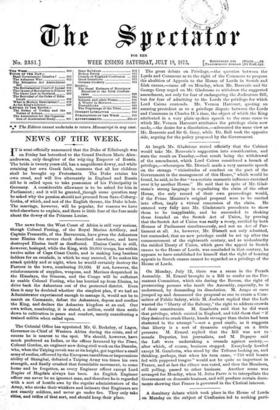At length Mr. Gladstone stated officially that the Cabinet would
take Mr. Bouverie's suggestion into consideration, and state the result on Tuesday,—that result being the withdrawal of the amendment, which Lord Cairns considered a breach of privilege,—whereupon Mr. Disraeli made a very sarcastic speech On the strange "vicissitudes of conduct on the part of the Government in the management of this House," which would be found, he said, to be due "to a certain mesmeric influence exercised over it by another House." He said that in spite of Mr. Glad- stone's strong language in repudiating the claim of the other House, the only record of their own proceedings would, if the Prime Minister's original proposal were to be carried into effect, imply a virtual concession of the claim. He entered very fully into Mr. Gladstone's precedents to show them to be inapplicable, and he succeeded in shaking those founded on the Scotch Act of Union, by proving that the Scotch Act of Union was really a treaty, ratified by both Houses of Parliament simultaneously, and not an Act of Par- liament at all. As, however, Mr. Disraeli not only admitted, but contended, that no new privilege could be set up after the commencement of the eighteenth century, and as undoubtedly the ratified Treaty of Union, which gave the appeal in Scotch causes to the House of Lords, was concluded in that century, he appears to have established for himself that the right of hearing appeals in Scotch causes cannot be regarded as a privilege of the House of Lords.


































